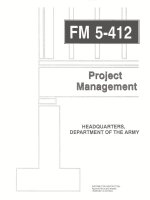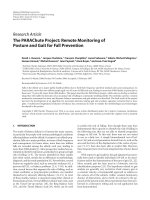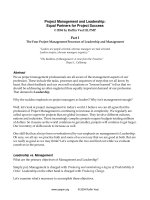The four project management processes of leadership and management
Bạn đang xem bản rút gọn của tài liệu. Xem và tải ngay bản đầy đủ của tài liệu tại đây (80.99 KB, 5 trang )
Project Management and Leadership:
Equal Partners for Project Success
© 2004 by Ruffin Veal III, PMP
Part I
The Four Project Management Processes of Leadership and Management
“Leaders are people oriented, whereas managers are task oriented.
Leaders inspire, whereas managers organize.”
“The Realities of Management: A view from the Trenches”
Royce L. Callaway
Abstract
We as project management professionals are all aware of the management aspects of our
profession. These include the tasks, processes and sequences of steps that we all know by
heart. But client feedback and our own self evaluations or “lessons learned” tell us that we
should be addressing an often neglected thou equally important demand of our profession.
That demand is Leadership.
Why the sudden emphasis on project managers as leaders? Why isn't management enough?
Well, let's look at project management in today's world. I believe we can all agree that the
profession of Project Management is continuing to increase in complexity. We regularly are
called upon to supervise projects that are global in nature. They involve different cultures,
nations and industries. These increasingly complex projects require budgets totaling millions
of dollars. So it seems as the world continues to get smaller, projects will continue to get larger.
Our inventory of skills needs to increase as well.
One skill that has always been overshadowed by our emphasis on management is Leadership.
Oh sure, we all say we practice both and some of us even say that we are good at both. But are
we really as good as we may think? Let's compare the two and find out while we evaluate
ourselves in the process.
Leadership vs. Management
What are the primary objectives of Management and Leadership?
Simply put, Management is charged with Producing and maintaining a degree of Predictability &
Order. Leadership on the other hand is charged with Producing Change.
Let's examine what's necessary to accomplish these objectives.
www.asapm.org
© 2004 Ruffin Veal
asapm exclusive: Ruffin Veal on Leadership, Part 1 of 2
page 2
A summary of our Project Management and Leadership responsibilities can be condensed into
what I call the four processes of Management and Leadership. They are:
1) Creating an Agenda
2) Developing a Team
3) Execution of the Agenda
4) Evaluation of the Outcome
First of all, we will address each process by determining the individual responsibilities of
Management and Leadership for each.
We will then consider the primary functions and activities of each responsibility.
1) Creating an Agenda
Management Responsibilities: Planning & Budgeting.
These responsibilities involve establishing detailed steps and timetables for achieving needed
results and then allocating the resources necessary to make that happen.
Management Functions and Activities
Our primary function here is to help produce predicable results on important dimensions (e.g.
being on time and within budget) by planning for those results.
Activities involve a deductive process. We develop a detailed map of how to achieve the
results expected by stakeholders (clients, users, customers) along with timetables consisting of
what, when , who and the costs involved.
Leadership Responsibilities: Establishing Direction
Our responsibility here is to develop a vision of the future and strategies for producing the
change needed to achieve that vision.
Leadership Functions and Activities
At this point our objective is to establish the direction for change needed to cope with our
changing business environment.
This is an inductive process. The objective of the activities involved here is to develop a vision
which describes key aspects of an organization in the future along with a strategy for
achieving that future state.
2) Developing a Team
Management Responsibilities: Organizing & Staffing
Here we are establishing some structure for:
a) accomplishing our plan
b) staffing the project
c) responsibility/authority
www.asapm.org
© 2004 Ruffin Veal
asapm exclusive: Ruffin Veal on Leadership, Part 1 of 2
page 3
d) policies/procedures
e) monitoring the process.
Management Functions and Activities
Our focus here is to create an organization that can implement our plan and thus can produce
predictable results on important dimensions.
Our activities are directed toward developing a process of organizational design involving
judgment about “fit”. We want to determine the best compatibility option for matching:
a) our organizational/staffing structure to our plan
b) parts of our plan to individual team members
c) compensation to our plan and the people involved
d) project tasks to individual skill sets.
Leadership Responsibilities: Aligning People
As leaders we are communicating the project direction by words and deeds. We want to
influence the team-building process of the project. Our goal here is to ensure the teams'
understanding and acceptance of the project direction , vision and strategies.
Leadership Functions and Activities
The function here is to get people lined up behind a vision and set of strategies. This will help
produce the change needed to address a changing business environment.
In as clear and credible way as possible, we must get people to understand and believe the
vision/strategies by communicating with the individuals needed to make that project
direction a reality.
3) Execution of the Agenda
Management Responsibilities: Controlling & Problem-Solving
Under this heading we are monitoring results vs. our plan in some detail, identifying
deviations and then planning & organizing to solve any problems.
Management Functions and Activities
Our function here is to minimize deviation from the plan and thus produce predictable results
on important decisions.
Activities here are concerned with monitoring results vs. the plan. This is done in some detail
by means of control mechanisms (reports, meetings). Using these we identify deviations from
our plan and then re-plan and organize to resolve those deviations.
Leadership Responsibilities: Motivating & Inspiring
Our accountability here is to energize people to overcome major political, bureaucratic and
resource barriers to change. This is done by satisfying very basic but unfulfilled human needs.
www.asapm.org
© 2004 Ruffin Veal
asapm exclusive: Ruffin Veal on Leadership, Part 1 of 2
page 4
Leadership Functions and Activities
The function here is to energize people to overcome major obstacles toward achieving a vision.
Success here will help produce the awareness and any attitude adjustments needed to cope
with environmental changes.
To accomplish this we need to satisfy very basic human needs. These involve the need for
achievement, recognition and living up to one's ideals. The goal here is to create an unusually
high level of energy and enthusiasm in people.
4) Evaluation of the Outcome
We evaluate the success of our management approach by comparing our results to our
management agenda. The goal of that agenda is to produce and maintain a degree of
predictability and order that has the potential of consistently producing key results expected
by various stakeholders.
How successful have you been as a manager on a project?
Determine how effectively you handled any deviations from the project plan. In addition,
analyze what affect these deviations had on the overall outcome of the project with relation to
cost, time and scope.
As with management, the success of our leadership approach is determined by comparing our
results to our leadership agenda. The goal of our leadership agenda is to produce change. The
change produced is often to a dramatic degree and has the potential of being extremely useful
in the future.
How successful have you been as a leader on a project?
Determine how much dramatic, positive, long-lasting change has taken place for the
organization. Then do the same for yourself and your team members.
Well, how do you rate yourself as a leader? Need more input? In Part II of this article entitled,
“Leadership and the Project Management Professional”, I'll be providing some insights and
ideas on the subject of leadership. We'll investigate the 8 characteristics of successful leaders.
We'll also address the appropriate use of different leadership styles.
End of Part I
About the Author
Ruffin Veal III has been an Information Technology professional for over 30 years. He has had
increasing levels of responsibility throughout that time in such private sector industries as
manufacturing, retailing, banking, medical and others. During that time he has also been
employed both full time and as a consultant with such public sector employers as the State of
Minnesota and Ramsey County, Minnesota.
www.asapm.org
© 2004 Ruffin Veal
asapm exclusive: Ruffin Veal on Leadership, Part 1 of 2
page 5
“During that 30 year period I have been what I call an “in the trenches” professional. That is,
one who has relied on resolving problems encountered by all IS/IT professionals with
practical “non-perfect world” means. There are a lot of theories out there but I've found that
nothing beats knowledge based on experience.” says, Veal. “Most advice given by many
consultants and speakers is either too costly, too time consuming or just downright
impractical. The presentations are great but the listener has little to take back to the office and
implement in a quick, affordable manner. He/She has even a smaller chance of seeing any
short-term return on investment.” “Emphasis on real world information technology solutions
is what you will see in my presentations”.
Ruffin Veal III is an author, speaker and President of Ruffin Veal & Associates, Inc. an
information technology consulting firm specializing in organizational leadership &
management, project management and client relations.
www.asapm.org
© 2004 Ruffin Veal









